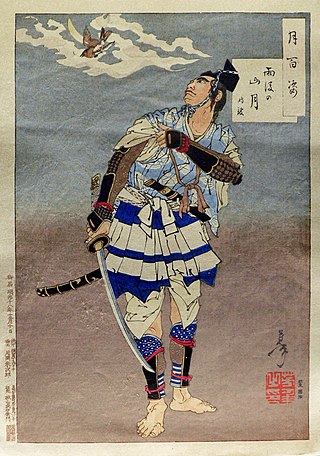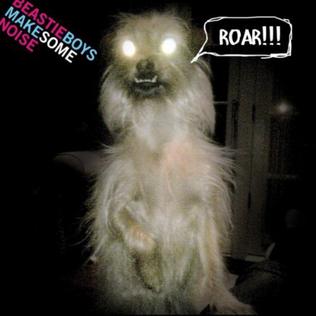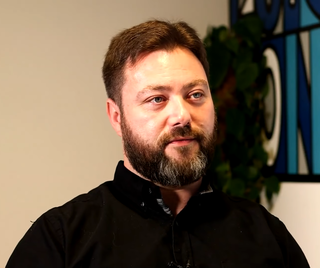In theoretical computer science, a nondeterministic Turing machine (NTM) is a theoretical model of computation whose governing rules specify more than one possible action when in some given situations. That is, an NTM's next state is not completely determined by its action and the current symbol it sees, unlike a deterministic Turing machine.
In law, possession is the control a person intentionally exercises toward a thing. Like ownership, the possession of anything is commonly regulated by country under property law. In all cases, to possess something, a person must have an intention to possess it. A person may be in possession of some property.

In finance, a warrant is a security that entitles the holder to buy or sell stock, typically the stock of the issuing company, at a fixed price called the exercise price.

"Two plus two equals five" is a mathematically incorrect phrase used in the 1949 dystopian novel Nineteen Eighty-Four by George Orwell. It appears as a possible statement of Ingsoc philosophy, like the dogma "War is Peace", which the Party expects the citizens of Oceania to believe is true. In writing his secret diary in the year 1984, the protagonist Winston Smith ponders if the Inner Party might declare that "two plus two equals five" is a fact. Smith further ponders whether or not belief in such a consensus reality makes the lie true.
The right to silence is a legal principle which guarantees any individual the right to refuse to answer questions from law enforcement officers or court officials. It is a legal right recognized, explicitly or by convention, in many of the world's legal systems.

Discipline refers to rule following behavior, to regulate, order, control and authority. It may also refer to punishment. Discipline is used to create habits, routines, and automatic mechanisms such as blind obedience. It may be inflicted on others or on oneself. Self discipline refers to the practice of self restraint, controlling one's emotions, and ignoring impulses.

In religion, a blessing is the impartation of something with grace, holiness, spiritual redemption, or divine will.
Are Ye Right There Michael is a song by the 19th-century and early 20th-century Irish composer and musician Percy French, parodying the state of the West Clare Railway system in rural County Clare. It was inspired by an actual train journey in 1896. Because of a slow train and the decision of the driver to stop for no apparent reason, French, though having left Sligo in the early morning, arrived so late for an 8pm recital that the audience had left. The ballad caused considerable embarrassment for the railway company, which was mocked in music halls throughout Ireland and Britain because of the song. It led to an unsuccessful libel action against French.

"To be, or not to be" is the opening phrase of a soliloquy given by Prince Hamlet in the so-called "nunnery scene" of William Shakespeare's play Hamlet, Act 3, Scene 1. In the speech, Hamlet contemplates death and suicide, weighing the pain and unfairness of life against the alternative, which might be worse. The opening line is one of the most widely known and quoted lines in modern English literature, and the soliloquy has been referenced in many works of theatre, literature, and music. Hamlet is not alone as he speaks—Ophelia is present, and Claudius and Polonius have concealed themselves. Claudius and Polonius have placed Ophelia in Hamlet's way in order to overhear their conversation and find out if Hamlet is really mad or only pretending. Even so, Hamlet seems to consider himself alone, and there is no indication that the others hear him before he addresses Ophelia.

LinkedIn is an American business and employment-oriented online service that operates via websites and mobile apps. Launched on May 5, 2003, the platform is primarily used for professional networking and career development, and allows job seekers to post their CVs and employers to post jobs. From 2015 most of the company's revenue came from selling access to information about its members to recruiters and sales professionals. Since December 2016, it has been a wholly owned subsidiary of Microsoft. As of February 2022, LinkedIn has 830+ million registered members from over 200 countries and territories.
Might makes right or Might is right is an aphorism on the origin of morality, with both descriptive and prescriptive senses.
Tu quoque is a discussion technique that intends to discredit the opponent's argument by attacking the opponent's own personal behavior and actions as being inconsistent with their argument, therefore accusing hypocrisy. This specious reasoning is a special type of ad hominem attack. The Oxford English Dictionary cites John Cooke's 1614 stage play The Cittie Gallant as the earliest use of the term in the English language. "Whataboutism" is one particularly well known modern instance of this technique.

A file folder is a kind of folder that holds papers and money together for organization and protection. File folders usually consist of a sheet of heavy paper stock or other thin, but stiff, material which is folded in half, and are used to keep paper documents. Files may also contain other things like magazines, cased in music CDs, etc. sometimes mostly not used for any official use, rather used as normal storage in a home. They are often used in conjunction with a filing cabinet for storage. File folders can easily be purchased at office supply stores.
Psychic bid is a bid in contract bridge that grossly misstates the power and/or suit lengths of one's hand. It is used deliberately to deceive the opponents. Normally, the psychic bid is made with a weak hand, overstating its overall strength, the length and strength in a particular suit, or both.
Cognitive therapy (CT) is a type of psychotherapy developed by American psychiatrist Aaron T. Beck. CT is one therapeutic approach within the larger group of cognitive behavioral therapies (CBT) and was first expounded by Beck in the 1960s. Cognitive therapy is based on the cognitive model, which states that thoughts, feelings and behavior are all connected, and that individuals can move toward overcoming difficulties and meeting their goals by identifying and changing unhelpful or inaccurate thinking, problematic behavior, and distressing emotional responses. This involves the individual working with the therapist to develop skills for testing and changing beliefs, identifying distorted thinking, relating to others in different ways, and changing behaviors. A cognitive case conceptualization is developed by the cognitive therapist as a guide to understand the individual's internal reality, select appropriate interventions and identify areas of distress.

The GNU General Public License is a series of widely used free software licenses that guarantee end users the four freedoms to run, study, share, and modify the software. The license was the first copyleft for general use and was originally written by the founder of the Free Software Foundation (FSF), Richard Stallman, for the GNU Project. The license grants the recipients of a computer program the rights of the Free Software Definition. These GPL series are all copyleft licenses, which means that any derivative work must be distributed under the same or equivalent license terms. It is more restrictive than the Lesser General Public License and even further distinct from the more widely used permissive software licenses BSD, MIT, and Apache.

"Make Some Noise" is a song by American hip hop group the Beastie Boys, released as the third single from their eighth and final studio album, Hot Sauce Committee Part Two (2011). Following two other singles from the album, "Make Some Noise" was released on 11 April 2011, prior to the album's release. The song is also their highest-charting single since 2004's "Ch-Check It Out", peaking at No. 1 on the Nielsen BDS alternative rock indicator chart. The song appears on the soundtrack to the videogame Madden NFL 12.
The right to be heard is a child rights principle as defined by the UN Convention on the Rights of the Child. According to Article 12 of the convention, children have the right to express their views in all matters affecting them and their views have to be given due weight in accordance with the age and maturity of the child. This right applies equally to children's participation in social and political matters as well as in judicial and administrative proceedings. As a general principle, the child's right to be heard reflects the concept of children's ‘agency’, viewing children not only as vulnerable persons in need of special protection, but also as informed decision makers, rights holders and active members of society.

Carl Benjamin, also known by his online pseudonym Sargon of Akkad, is a British far-right anti-feminist YouTuber and political commentator. A former member of the Eurosceptic right-wing UK Independence Party (UKIP), he was one of its unsuccessful candidates for the South West England constituency in the 2019 European Parliament election.









